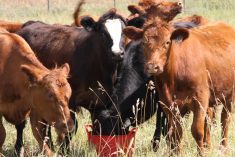SARATOV, Russia (Reuters) – Russian president Dmitry Medvedev has ordered law enforcement agencies to prevent speculators from driving up food prices after the worst harvest in years.
He has also pledged help to ensure affordable food staples.
Russia’s leaders are worried that recent price increases for staples such as flour, buckwheat, pasta and meat could undermine the government’s support ahead of the 2012 presidential election.
Russia’s summer drought will lead to a price shock for three to six months, though inflation should be seven percent for the year, said central bank first deputy chair Alexei Ulyukayev.
Read Also

Organic farmers urged to make better use of trade deals
Organic growers should be singing CUSMA’s praises, according to the Canadian Chamber of Commerce.
Medvedev said speculators were driving up prices for certain food such as buckwheat, which has been a Russian staple for centuries.
“The speculators need to be caught,” Medvedev said.
“There are no objective reasons for the current changes in price (for food products).”
He said the government and regional leaders must keep the situation under control.
“If the situation changes, I will take the decision to ensure our citizens have quality and affordable food … This is a priority for the state.”
Russia’s grain harvest is expected to fall to 60 to 65 million tonnes this year from 97 million tonnes harvested in 2009 after what the state weather agency said is Russia’s worst drought in more than a century.
Medvedev said Russia, which was the world’s third largest wheat exporter before this year’s poor harvest, would seek to regain its position on world markets.
“In recent years we returned Russia to the status of a leading world exporter of grain and we shall move forward,” he said.
“Despite the unusual heat, despite the drought, our country has enough reserves of grain.”
Agriculture minister Yelena Skrynnik set an ambitious target to increase the harvest to 85 to 90 million tonnes of grain in 2011.
Medvedev said there was enough grain with carryover stocks of 21 to 25 million tonnes.
Russia, which usually enjoys seasonal, harvest-time deflation in late summer and early autumn, has this year seen prices surge as people stock up on staples after the drought killed one-third of the grain crop.
Medvedev has toured villages, dairy farms and meat processing plants in an effort to reassure Russians, who still remember the empty shelves and soaring food prices leading up to and following the 1991 collapse of the Soviet Union.
He said he was particularly concerned about the price of buckwheat, which millions of ordinary Russians like to eat as porridge or with mushrooms and onions.
“People are buying up this buckwheat from big retailers in the evenings, using sacks to fill up their trucks, and then selling it in small shops and markets,” Medvedev said.
“Those who are involved in hiking up prices, those involved in earning unjustified profits, should be dealt with by prosecutors, by the police, by the anti-monopoly and tariff services.”
The poor harvest in the republics of the former Soviet Union has sent world grain prices soaring as some governments such as those in Russia and Ukraine stopped or curbed exports.
However, Ukraine’s wheat exports rose to 430,000 tonnes in August from 225,000 tonnes in July despite informal export limits introduced by the Ukrainian Customs Service, according to analyst UkrAgroConsult.














